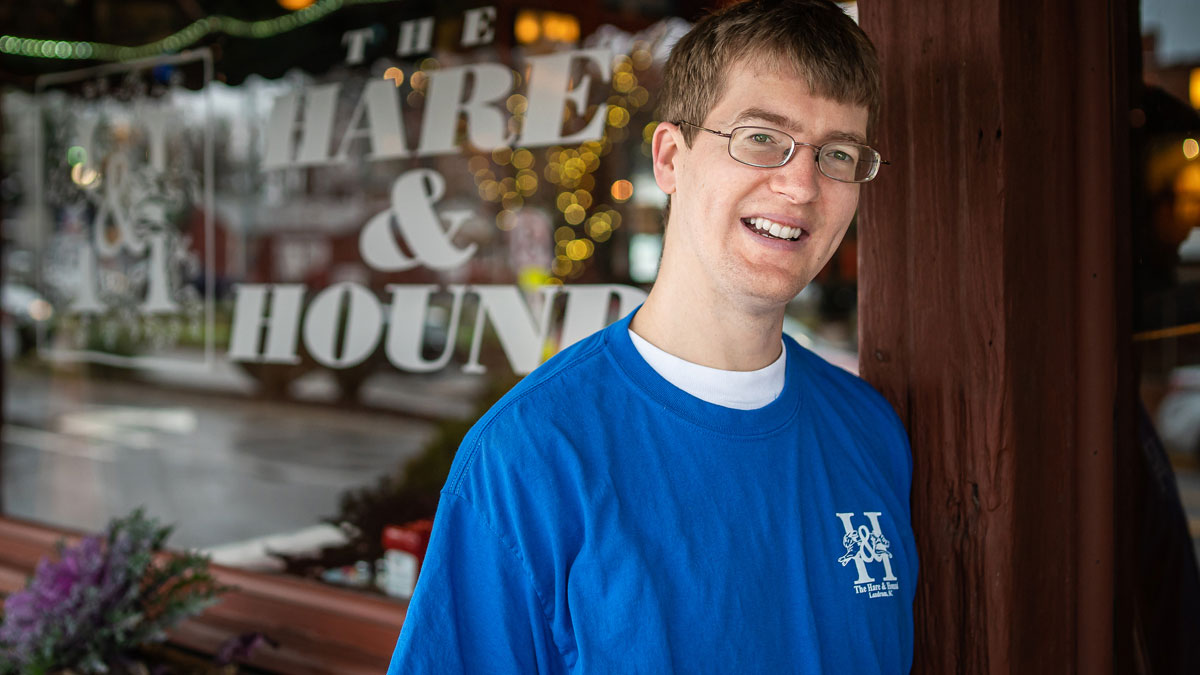Nancy Lowe had a suspicious hunch when her son, Josh, was just 6 months old that something was not quite right. Yes, her baby was happy and constantly smiling, but he was not physically active the way his brothers had been at the same age. She decided to double-check with her physician and felt frustrated when the doctors determined Josh to be “fine.”
Of course, that was more than 30 years ago – Josh Lowe is now 32 – when autism was not as common a diagnosis. Eventually, when Josh reached 22 months and still had not begun to walk or speak, the Lowes were informed he was developmentally delayed. Nevertheless, they would not hear the term “autism” for a few more years.
Life in Utah: A Turning Point
When Josh was around 5 years old, Nestle, where Bob Lowe worked, moved the family to Utah. The Lowes enrolled their young son in school, and it was in Josh’s classroom that Nancy first heard about the possibility of autism.
“His teacher was the first person to mention the word autism to me,” she remembered. “I didn’t believe her when she mentioned it. I was putting my faith in the doctors, and they had never used that term. It was, at the time, a negative diagnosis.”
Still, the teacher’s emboldened remark turned out to be an important turning point for the Lowes. At the University of Utah Medical Center, which was “the family’s first experience with a research hospital,” Josh was officially diagnosed as having autism, and Nancy began attending seminars for parents of children with the disease.
“I went to the seminars several times because Josh fit the description,” she said. “It was so helpful to me. But I wouldn’t have done it if that preschool teacher hadn’t said what she said.”
In addition to the seminars, Nancy and Bob reached out to the speech and language department at Brigham Young University, which was seeking children to evaluate at no cost and was, in the words of the Lowes, “a wonderful evaluation that taught [them] how to work with Josh.”
Cleveland: The High School Years
After seven happy years in Utah, the Lowes once again packed up and moved, this time to Cleveland, Ohio. A few challenges surfaced, but, once again, Josh’s situation was met with compassionate, knowledgeable individuals who wanted to help.
“We lived in an area where the local schools didn’t serve him, so he had to ride 45 minutes each way to school,” Nancy said. “But he was blessed with another teacher who said she would get him as far as she could.”
The teacher taught Josh how to read and do math with the help of music, which motivated him as a student. Slowly, Josh’s social and scholastic skills were sharpened. In high school, he split his time between regular and vocational courses, where he was taught useful work skills such as shaking hands and making eye contact. And, because Josh loved football, one of his teachers introduced him to the coach and got him a special job as the water boy.
Adulthood and Beyond
Today, the Lowes are back in upstate South Carolina, and Josh works hard at a friendly “Cheers-like” pub known as The Hare & Hound – a position that he acquired through a vocational rehab program. At the pub, Josh does a little of everything, from rolling silverware to cleaning menus to making sure each table is outfitted with a salt and pepper shaker. Aside from work, he has a busy social life and loves staying fit. According to his parents, Josh goes to the gym most days of the week to do aerobics and lift weights. He also plays miracle league baseball, participates in Special Olympics swimming and even rides horses.
“He’s a diehard Gamecock and also loves the Buckeyes and Browns,” shared Bob and Nancy. “He loves music and has a CD player – he doesn’t really like smartphones. He has a dog to keep him busy, and he’s very close to his two brothers.”
“Adults with autism are no different than you and I,” said Nancy Scarborough, a special education preschool teacher, caregiver and longtime friend of the Lowes. “They need to feel important, valued and loved; they need social interactions and purpose in life. The opportunities and possibilities that lay before Josh are endless, and they wouldn’t be possible without the inclusive environment in the Greenville/Spartanburg area.”
Josh’s physician, Dr. Douglas Wiley at Family Physicians of Spartanburg, echoed the sentiment that Josh is successful because he has unwavering support.
“Josh continues to do well because of his environment,” he pointed out. “I cannot overemphasize the value of his family, particularly his parents – the countless hours spent encouraging, advocating, seeking opportunities.”
The Lowes, Dr. Wiley and Nancy Scarborough all agreed that the work being done in the medical community to understand autism is heartening, and that addressing people with these types of disabilities in a positive light – and finding them their place in the community – is becoming more common. Bob Lowe, who has worked in human resources for years, sees the changes firsthand.
“There are a lot of groups that serve young people with disabilities,” he said. “And companies are getting more and more apt to place young adults with disabilities into opportunities. It’s becoming more acceptable.”
“I’m certainly no expert in autism or spectrum disorders. However, increasing awareness and identifying the disorder will continue to lead to investigation and therefore optimization of treatment plans tailored to the individual person and their specific needs,” Dr. Wiley added, pointing out that he, like the Lowes, is “encouraged by existing programs that provide quality of life opportunities for patients and their families.”
“As his physician, I advise and direct, but it’s his parents who deserve credit and give him the opportunity to thrive,” he continued. “Their dedication to Josh’s well-being truly defines modern heroism.”
By Denise K. James
